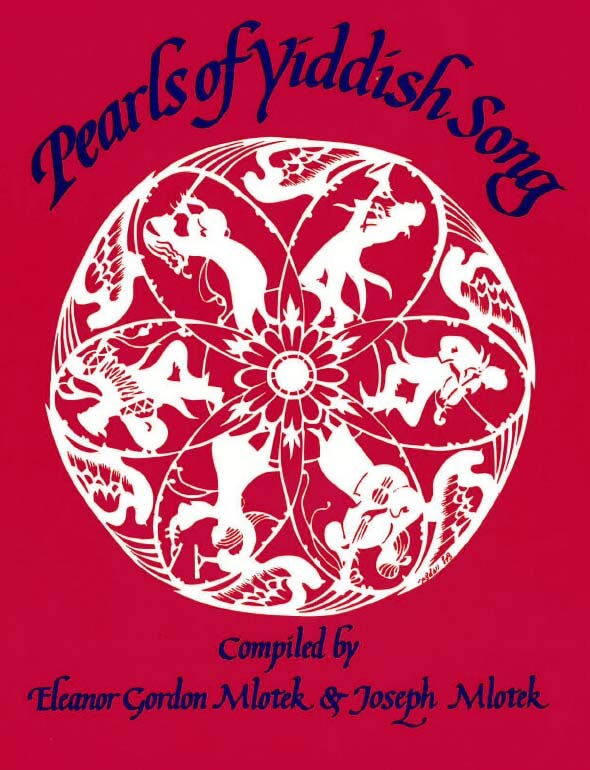Words by Hersh D. Nomberg (1876-1927); text and music published in Ost und West in 1908.
In his article, “My first meeting with Peretz,” the writer Sholem Asch describes the genesis of this song around 1897:
“The cultivation of the folksong in Peretz’s home began in the following manner: When Peretz had been arrested for alleged political activities. Nomberg composed a song — to which he fitted a melody opening with the words “Es yogn, es loyfn shvartse volkn” (Dark clouds race and rush). The song was first sung in Peretz’ house on Saturday evening when we met there. From there it spread to the street. A few weeks later, it could be heard in workshops and factories. Since the author’s name was unknown, it came to be regarded as folksong. Thus Nomberg’s song led to the custom of singing folksongs at Peretz’s on the Sabbath.”
During the Holocaust, the song was adapted for deportees to Transnistria across the Bug River: “Es loyfn un klapn di mashinen,/ Un es fayft der tsug./ Mir, farshikte, zitsn drinen —/ Men firt undz tsum bug” (The engines race and rattle and the train whistles. We, deportees, sit inside. We’re being taken to the Bug River.) This version was published by E. Saculet in 1959, Lin Yaldati and Eberhard Rebling in 1966, and Chana Mlotek and Malke Gottlieb in 1983.

Dark clouds race and rush,
the wind whistles and blows —
From Siberia, your father sends
a greeting to you, my child.
Only the wind brings us greetings
from that cold land
He is standing there, holding a shovel
in his hands.
And he digs, deeper and deeper
shoveling out the dirt;
don’t worry — it is for the lies
that he is digging graves.
Not the first, nor the last
to fall in the field.
Don’t be troubled, my child, you were born
of a great hero.
And you will grow up to be a hero,
So sleep dear, sleep now;
gather strength for the future,
gather it, my only child.
S’loyfn, s’yogn shvartse volkn,
S’fayft un blozt der vint —
Fun sibiryen shikt dayn tate
Dir a grus, mayn kind!
Nor der vint, er brengt undz grusn
Fun dem kaltn land:
Dortn shteyt er, a lopate
Halt er in der hant.
Un er grobt alts tifer, tifer,
Varft di erd aroys
Nit gezorgt dokh — farn sheker
Grobt er kvorim oys
Nit der ershter. nit der lefster,
Falt er oyfn feld;
Zorg nit, kind mayns. dikh geborn
Hot a groyser held.
Un a held vestu oysvaksn,
Shlof zhe, shlof atsind;
Zaml koykhes far der tsukunft,
Zaml, eyntsik kind!
ס’לױפֿן, ס’יאָגן שװאַרצע װאָלקן,
ס’פֿײַפֿט און בלאָזט דער װינט —
פֿון סיביריען שיקט דײַן טאַטע
דיר אַ גרוס, מײַן קינד!
נאָר דער װינט, ער ברענגט אונדז גרוסן
פֿון דעם קאַלטן לאַנד;
דאָרטן שטײט ער, אַ לאָפּאַטע
האַלט ער אין דער האַנט.
און ער גראָבט אַלץ טיפֿער, טיפֿער,
װאַרפֿט די ערד אַרױס;
ניט געזאָרגט דאָך — פֿאַרן שקר
גראָבט ער קבֿרים אױס.
ניט דער ערשטער, ניט דער לעצטער,
פֿאַלט ער אױפֿן פֿעלד
זאָרג ניט, קינד מײַנס, דיך געבאָרן
האָט אַ גרױסער העלד.
און אַ העלד װעסטו אױסװאַקסן,
שלאָף זשע, שלאָף אַצינד;
זאַמל כּוחות פֿאַר דער צוקונפֿט,
זאַמל, אײנציק קינד!
Song Title: S’loyfn, S’yogn Shvartse Volkn

First published in 1988 as Pearls of Yiddish Song: Favorite Folk, Art and Theatre Songs, this anthology contains 115 songs. Some material had never been published, while others, included in rare song collections or sheet music, were largely inaccessible. The songs presented reflect Jewish life in Eastern Europe and the United States and depict childhood, love, family celebrations, poverty, work and struggle. There are also songs from the Hasidic and Maskilic movements, songs of Zion and of America, as well as songs from the Yiddish theater.
The title of this anthology derives from the weekly two-page feature column “Pearls of Yiddish Poetry,” which the compilers Yosl and Chana Mlotek initiated in 1970 in the Yiddish newspaper Der Forvertz (the Yiddish Daily Forward). Hundreds of readers from around the world — including authors, composers, singers, actors — became co-participants in this collective folk project and recalled melodies, lines, fragments, stanzas and their variants of songs, poems, and plays which they had heard in their youth. At first, readers sent in only written material. Later, they also taped songs on cassettes, many of whose melodies had, until then, never been recorded. They also identified and supplied missing information regarding lyricists, poets, and composers and described the circumstances surrounding the songs’ origins, their dissemination, diffusion and impact.